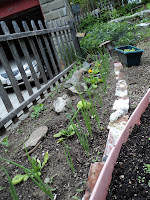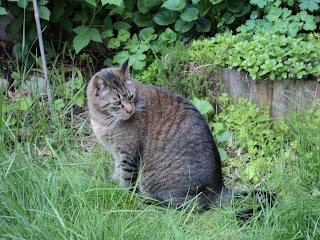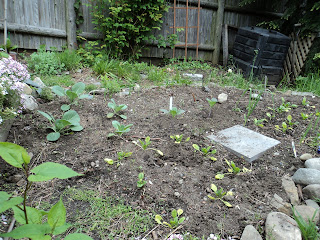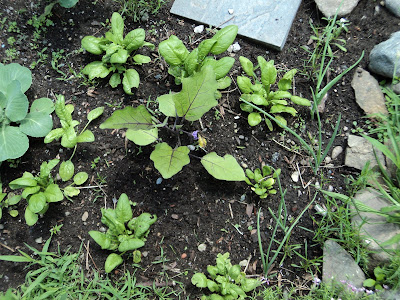It's funny, I thought this year was much colder and wetter than other years... (we just had our first stretch of warm, sunny weather in the last few days of May)...but looking back one year in the blog, I noticed a post with the same title as this one....apparently, last year memorial day was also the first time it got warm enough to put everything in the ground (especially tender stuff, like the tomatoes and eggplants.) And I thought I was slacking. Nope, turns out we just live pretty far north, in the scheme of things. Reading Barbara Kingsolver's
Animal, Vegetable, Miracle (my annual re-reading), she talks about putting in tomatoes and harvesting lettuce in the first week of May. I feel only pissy envy ("Well, if we all lived in Virginia, maybe we could all have an extra two months growing season, and maybe I could grow melons and okra and peppers that needed their own cages!).
 |
| "upstairs" back garden: shade-tolerant |
As it is, weather is a huge part of our limitations as gardeners up here, and getting to know, and possibly accept, the growing cycle, is a part of it. I know I shouldn't be shocked by looking back to last year's May pictures, but when I remember last year's garden, I remember the July version - five foot tall tomato plants and every possible growing space filled with plants, or, less happily, weeds. Its a big surprise to see how much last year's Memorial Day pictures look like this year's. I guess I feel like I should be starting earlier, or the weather should be warmer - I should be ready to eat things by now. But its just not time yet.
 |
| My second attempt at a perennial border, May '11 |
Here's what I try to remind myself: June is when we harvest lettuce, peas, bok choi, broccoli (if we're lucky) and maybe some tiny carrots. Beans, cukes and zukes won't be until July, tomatoes and eggplants at the very end. And then the season goes until mid-september. Be patient, I try to tell myself, but it feels unfair. It's exciting to be eating fresh-grown stuff right from the backyard - nothing tastes quite like it - but if we want to try to eat garden-fresh all year long, its a lot to bank on basically eight weeks. This year I opened up a new bed and planted it full of Roma tomatoes for canning - two hybrid romas, two heirloom "paste" tomatoes. It feels like a luxury to devote a whole bed just for canning (and don't worry, I'm trying to squeeze out every inch of space from it before the tomates get big), but I think its something I want - its been fun to make sauce from our home "cans" this winter, and it would be easier with more Romas, even if they are more "meaty", less spicy-juicy than some of their heirloom cousins.
This year I am trying to be mindful about where my gardening energy goes - I'm trying to think about what I really want to eat, not just how I can cram in the maximum number of plants. And so far, it feels good. I know that we can never get enough carrots, peppers, cucumbers or tomatoes, and I love my pickled, canned beans, so I tried to make space (or give space) to a lot of those.
|
 |
| Onions, lettuce, and tiny peas along the fence. |
|
I loved my tiny golden beets from last year, and now there is a beet patch. But gone are chard and zucchinis, big broccolis and a huge sunny spot devoted to herbs. The broccoli takes up a lot of space and barely gets going. The Zucchinis always get borers. The herbs have been moved to shadier locations, freeing up space. And nobody ever ate the chard. The carrots were planted all at once, instead of the whole-summer labor of love that used to be devoted to getting a new crop every two weeks, like the package recommends, and always ends up confusing me about what to harvest when. We're working here for maximum satisfaction, maximum yumminess, for the least amount of stress and worry. I've been putting lots of time into the garden recently, but that's because I have the time, and the weather is beautiful. Later, I hope to not feel guilty about not doing enough or not eating enough of the produce. If I don't get a second crop of lettuce or peas, I'll try not to fret. Sure, I'll work my butt off canning tomatoes and making bean pickles (and possibly sauerkraut, this year) - maybe I'll coerce Dawn into drying some herbs. But I'm planning on harvesting the lettuce young (no more waiting for it to reach "full size" and have it bolt) and the carrots all at once. I'm not trying to plant in marginal spaces anymore - I'm letting those go back to weeds and groundcover (and a violently virile oregano plant), and not wasting time planting anything where it won't thrive. I planted only potatoes and onions in my community garden plot - the kinds of things that can make it through a few hot days without any water, much less TLC. I'll give away what I can't plant or eat. Or at least, that's my plan. In May, this is my intention: to enjoy what I can, and not sweat the small stuff if I can't. (Let you know how it goes.)
 |
| Peas...soon w/ peppers and tomates |
Garden diary: By now, the carrot seedlings have shown their heads as have the beets. Both are a little patchy. The spinach is hardly growing, as usual, but the lettuce is big enough for a baby harvest, radishes on their way. This year I planted a bunch of cabbages (where the herbs used to be), and they are looking good. Tomatoes, peppers, and eggplant in the ground, bean teepee still needs to go up. (pics from May) Tasted first strawberry today- tart but very good.
Here's some pictures from the May garden, before the sun came out.
I'll have more of the June garden soon...
 |
| Monkey |
 |
| Dawn's front Raised Bed...in May. Compare with May 2010.... |
| |
 |
| Peas in the back. Party in the front. (radishes in the middle). Cucumbers coming later. |
 |
| Schlubby potato buckets (by now they've just sprouted) | | | | | | | |
|
|
 |
| Spinaches planted, w space for eggplant (I call this my "no dirt left behind" policy). | |
|
|
|

















